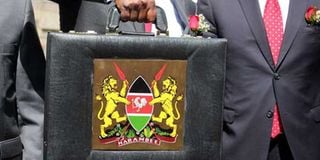How you will pay for the Sh2.7trn budget

The briefcase containing Kenya's budget statement. FILE PHOTO | NATION MEDIA GROUP
What you need to know:
- Treasury is projecting to collect Sh1.62 trillion in ordinary revenues, which is the money collected by the Kenya Revenue Authority (KRA), in taxes.
- This is a Sh22 billion decline from the Sh1.64 trillion it is hoping to collect in the current financial year.
- As if the debt load is not big enough, Kenya plans to go back to external funders to borrow Sh349.7 billion to plug the deficit, with the remaining Sh486.2 billion being borrowed domestically.
Treasury will today (Thursday) unveil a raft of taxes to fund the Sh2.7 trillion budget as the government tries to revive the economy while keeping its lights on.
Kenyans will know whether Cabinet Secretary Ukur Yatani will drop his plans to reintroduce tax measures that will drive up the costs of basic commodities including bread, cooking gas and clean energy stoves.
The Finance Bill has proposed to reintroduce a 14 per cent VAT on liquefied petroleum gas (LPG), inputs or raw materials for electric accumulators, helicopters and tractors, among others.
“The proposed VAT charge on LPG will also increase the price of cooking gas, which contradicts government efforts to shift consumers from the use of wood fuel to LPG to conserve our forests," KPMG says in its analysis of the proposed tax measures.
The alcohol industry is also set to suffer as more excise duty is loaded on spirits. The Bill also creates the National Roads Toll Fund — tolls collected will be remitted to this Fund.
The new taxes are also expected to hit retirees by subjecting income from the National Social Security Fund to tax.
Mr Yatani has further indicated that he will got after digital transactions by through the introduction of a digital service tax, which shall be payable on income derived or accrued in Kenya through a digital market place. If approved, Kenyans will pay 1.5 percent digital services tax on the gross transaction value, payable when making payment to the service provider.
Treasury also plans to increase the upper cap for residential income subject to the 10 per cent tax rate from Sh10 million to Sh15 million.
The Treasury CS had indicated that he was planning to reverse the decision that had scrapped taxes on a host of basic commodities in efforts to cushion Kenyan's against the Covid-19 pandemic. He is also expected to explain how Kenya will pay for the Sh904.7 billion budgeted for public debt servicing expenses in the Consolidated Fund Services (CFS).
The budget document notes that CFS expenditure, projected at Sh1.04 trillion, will consume 55 per cent of all the revenue that the government hopes to collect in the new year.
In the budget, Treasury is staring at a budget deficit of Sh835.9 billion, which can only be financed through additional debt.
As if the debt load is not big enough, Kenya plans to go back to external funders to borrow Sh349.7 billion to plug the deficit, with the remaining Sh486.2 billion being borrowed domestically.
The National Executive will take the lion's share of the billions at Sh1.82 trillion. The second biggest expenditure item will be CFS.
Counties are expected to receive Sh369.8 billion in the new budget, while Parliament and Judiciary will get Sh37.7 billion and Sh18 billion, respectively.
Treasury is projecting to collect Sh1.62 trillion in ordinary revenues, which is the money collected by the Kenya Revenue Authority (KRA), in taxes. This is a Sh22 billion decline from the Sh1.64 trillion it is hoping to collect in the current financial year.
“If you look at this budget critically, you will see that we are borrowing money to meet recurrent expenditure,” Mr John Mbadi, who is also a member of the Budget and Appropriations Committee, said.
The BAC says in its report that the Covid-19 pandemic is expected to have a negative impact on tax receipts due to reduced business activity and declining consumer demand.
Already the tax collections are expected to take a hit from the measures outlined to revive the economy.





